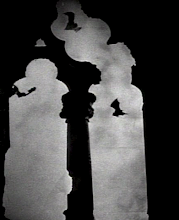
John William Polidori (7 September 1795 – 24 August 1821) was
an Italian-English physician and writer, known for his associations
with the Romantic movement and credited by some as the creator
of the vampire genre of fantasy fiction. His most successful work
was the 1819 short story, The Vampyre, the first vampire story in
English. Although originally and erroneously accredited to Lord
Byron, both Byron and Polidori affirmed that the story is Polidori's.

"The Vampyre" is a short story written by Polidori and
is a progenitor of the romantic vampire genre of fantasy fiction.
The work is described by Christopher Frayling as "the first story
successfully to fuse the disparate elements of vampirism into a
coherent literary genre."
>>Characters:
-Lord Ruthven—a suave British nobleman, the vampire
-Aubrey—a young gentleman, an orphan
-Ianthe—a beautiful woman Aubrey meets on his journeys with Ruthven.
-Aubrey's sister—who becomes engaged to the Earl of Marsden
-Earl of Marsden—who is also Lord Ruthven
>>Publication:
"The Vampyre" was first published on 1 April 1819 by Colburn
in the New Monthly Magazine with the false attribution "A Tale
by Lord Byron". The name of the work's protagonist, "Lord
Ruthven", added to this assumption, for that name was originally
used in Lady Caroline Lamb's novel Glenarvon (from the same
publisher), in which a thinly-disguised Byron figure was also
named Lord Ruthven. Despite repeated denials by Byron and
Polidori, the authorship often went unclarified.

The story was an immediate popular success, partly because of
the Byron attribution and partly because it exploited the gothic
horror predilections of the public. Polidori transformed the
vampire from a character in folklore into the form that is
recognized today—an aristocratic fiend who preys among high
society.
The story has its genesis in the summer of 1816, the Year Without
a Summer, when Europe and parts of North America underwent a
severe climate abnormality. Lord Byron and his young physician
John Polidori were staying at the Villa Diodati by Lake Geneva and
were visited by Percy Bysshe Shelley, Mary Wollstonecraft Shelley
and Claire Clairmont. Kept indoors by the "incessant rain" of that
"wet, ungenial summer", over three days in June the five turned to
telling fantastical stories, and then writing their own. Fueled by
ghost stories such as the Fantasmagoriana, William Beckford's
Vathek and quantities of laudanum, Mary Shelley produced what
would become Frankenstein, or The Modern Prometheus. Polidori
was inspired by a fragmentary story of Byron's and in "two or three
idle mornings" produced "The Vampyre".

>>Influence:
Polidori's work had an immense impact on contemporary sensibilities
and ran through numerous editions and translations. An adaptation
appeared in 1820 with Cyprien Bérard’s novel, Lord Ruthwen ou les
Vampires, falsely attributed to Charles Nodier, who himself then
wrote his own version, Le Vampire, a play which had enormous
success and sparked a "vampire craze" across Europe. This includes
operatic adaptations by Heinrich Marschner and Peter Josef von
Lindpaintner, both published in the same year and called "The
Vampire". Edgar Allan Poe, Nikolai Gogol, Alexandre Dumas, and
Alexis Tolstoy all produced vampire tales, and themes in Polidori's
tale would continue to influence Bram Stoker's Dracula and
eventually the whole vampire genre.
>>Plot:
A young Englishman Aubrey meets Lord Ruthven, a man of
mysterious origins who has entered London society. Aubrey
accompanies Ruthven to Rome, but leaves him after Ruthven
seduces the daughter of a mutual acquaintance. Aubrey travels
to Greece where he becomes attracted to Ianthe, an innkeeper's
daughter. Ianthe tells Aubrey about the legends of the vampire.
Ruthven arrives at the scene and shortly thereafter Ianthe is
killed by a vampire. Aubrey does not connect Ruthven with the
murder and rejoins him in his travels. The pair are attacked by
bandits and Ruthven is mortally wounded. Before he dies,
Ruthven makes Aubrey swear an oath that he will not mention
his death or anything else he knows about Ruthven for a year
and a day. Looking back, Aubrey realizes that everyone who
Ruthven met ended up suffering.

John William Polidori.
Aubrey returns to London and is amazed when Ruthven appears
shortly thereafter, once again alive. Ruthven reminds Aubrey of
his oath to keep his death a secret. Ruthven then begins to
seduce Aubrey's sister while Aubrey, helpless to protect his
sister, has a nervous breakdown. Ruthven and Aubrey's sister
are engaged to marry on the day the oath ends. Aubrey writes
a letter to his sister revealing Ruthven's history and dies. The
letter does not arrive in time. Ruthven marries Aubrey's sister,
kills her on their wedding night, and escapes.
Fonts:
Wikipedia
Polidori






































No comments:
Post a Comment